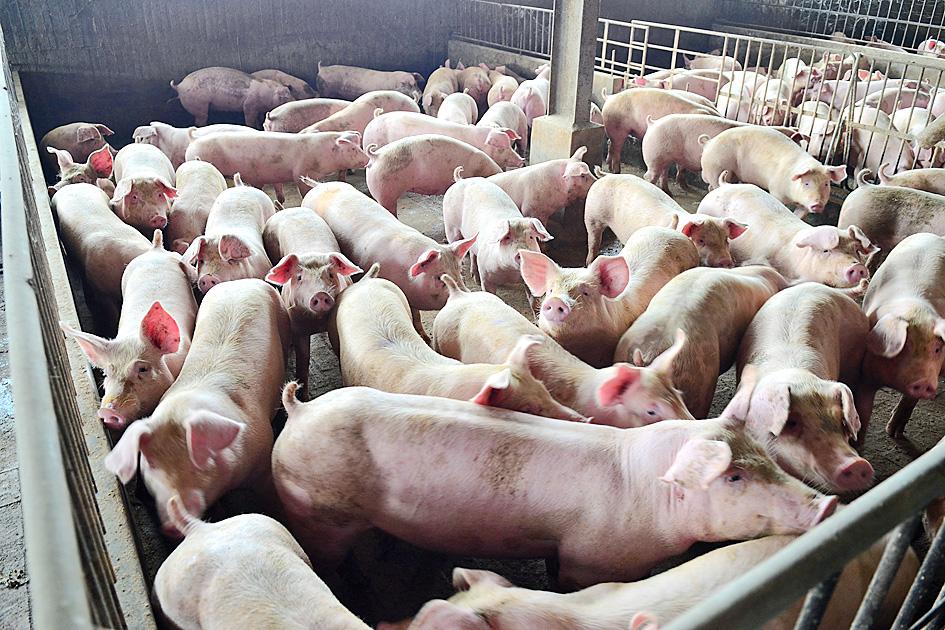A group of newborn pigs would not be vaccinated against classical swine fever (CSF) as part of an effort to resume exports of pork by 2023, the Council of Agriculture said on Saturday.
The council hopes to end all CSF vaccinations within two years and resume pork exports to countries such as Japan, it said.
Japan bans imports of pork from countries listed as CSF-affected by the World Organisation for Animal Health, which includes Taiwan.

Photo: Chiu Chih-rou, Taipei Times
The council said it would start by not vaccinating a group of two to three newborn pigs at the end of the month, and leave them together with vaccinated pigs for seven months to determine if they become infected.
“This will let us know if there is any trace of the virus in the pigs’ living environment,” council Deputy Minister Huang Chin-cheng (黃金城) said, adding that the council plans to have its first report on the situation by November.
The council would continue with the program, which the Executive Yuan has approved, until the middle of next year, he said.
Ending the vaccines is more difficult than ending those for foot-and-mouth disease, which Taiwan ended in 2018, Huang said.
“The virus causing CSF can make its way into many parts of the animal, such as the lymph glands, and there are many mutations of it,” he said, adding that the disease is not fatal, but can cause growth problems and other issues in infected pigs.
There has not been an outbreak of CSF in Taiwan in more than 10 years, and there has been no trace of the virus for the past two years, he said.
The council spent about NT$500 million (US$17.61 million) on its program to end foot-and-mouth disease vaccinations, and expects to budget a similar amount to end CSF vaccinations, he said, adding that the amount would be less than the amount spent on vaccines annually.
“If we are able to stop vaccinations and do not see an outbreak of CSF, then there will be nothing preventing the export of Taiwanese pork,” he said.

TRAFFIC SAFETY RULES: A positive result in a drug test would result in a two-year license suspension for the driver and vehicle, and a fine of up to NT$180,000 The Ministry of Transportation and Communications is to authorize police to conduct roadside saliva tests by the end of the year to deter people from driving while under the influence of narcotics, it said yesterday. The ministry last month unveiled a draft of amended regulations governing traffic safety rules and penalties, which included provisions empowering police to conduct mandatory saliva tests on drivers. While currently rules authorize police to use oral fluid testing kits for signs of drug use, they do not establish penalties for noncompliance or operating procedures for officers to follow, the ministry said. The proposed changes to the regulations require

The Executive Yuan yesterday announced that registration for a one-time universal NT$10,000 cash handout to help people in Taiwan survive US tariffs and inflation would start on Nov. 5, with payouts available as early as Nov. 12. Who is eligible for the handout? Registered Taiwanese nationals are eligible, including those born in Taiwan before April 30 next year with a birth certificate. Non-registered nationals with residence permits, foreign permanent residents and foreign spouses of Taiwanese citizens with residence permits also qualify for the handouts. For people who meet the eligibility requirements, but passed away between yesterday and April 30 next year, surviving family members

Taiwanese officials are courting podcasters and influencers aligned with US President Donald Trump as they grow more worried the US leader could undermine Taiwanese interests in talks with China, people familiar with the matter said. Trump has said Taiwan would likely be on the agenda when he is expected to meet Chinese President Xi Jinping (習近平) next week in a bid to resolve persistent trade tensions. China has asked the White House to officially declare it “opposes” Taiwanese independence, Bloomberg reported last month, a concession that would mark a major diplomatic win for Beijing. President William Lai (賴清德) and his top officials

The German city of Hamburg on Oct. 14 named a bridge “Kaohsiung-Brucke” after the Taiwanese city of Kaohsiung. The footbridge, formerly known as F566, is to the east of the Speicherstadt, the world’s largest warehouse district, and connects the Dar-es-Salaam-Platz to the Brooktorpromenade near the Port of Hamburg on the Elbe River. Timo Fischer, a Free Democratic Party member of the Hamburg-Mitte District Assembly, in May last year proposed the name change with support from members of the Social Democratic Party and the Christian Democratic Union. Kaohsiung and Hamburg in 1999 inked a sister city agreement, but despite more than a quarter-century of